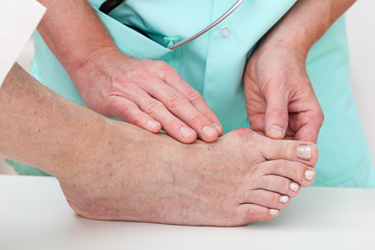A bunion is a painful deformity that occurs over time, causing a bony protrusion at the base of the big toe joint. Aside from being unsightly, a bunion can become quite painful and inflamed. Bunions are often caused by high heels that force the foot forward, or footwear that is pointy, tight at the toes, or puts pressure on the big toe joint. Heredity and diseases that affect the joints can increase the risk of a bunion developing. If you have a bunion, it’s suggested that you make an appointment with a podiatrist. There are a variety of methods that can be used to correct the deformity and restore the natural alignment of your big toe. After examining and assessing the bunion, your podiatrist will explain their findings and go over your treatment options.
If you are suffering from bunions, contact Dr. Michael A. Wood of Foot Health Institute. Our doctor can provide the care you need to keep you pain-free and on your feet.
What Is a Bunion?
A bunion is formed of swollen tissue or an enlargement of boney growth, usually located at the base joint of the toe that connects to the foot. The swelling occurs due to the bones in the big toe shifting inward, which impacts the other toes of the foot. This causes the area around the base of the big toe to become inflamed and painful.
Why Do Bunions Form?
Genetics – Susceptibility to bunions are often hereditary
Stress on the feet – Poorly fitted and uncomfortable footwear that places stress on feet, such as heels, can worsen existing bunions
How Are Bunions Diagnosed?
Doctors often perform two tests – blood tests and x-rays – when trying to diagnose bunions, especially in the early stages of development. Blood tests help determine if the foot pain is being caused by something else, such as arthritis, while x-rays provide a clear picture of your bone structure to your doctor.
How Are Bunions Treated?
- Refrain from wearing heels or similar shoes that cause discomfort
- Select wider shoes that can provide more comfort and reduce pain
- Anti-inflammatory and pain management drugs
- Orthotics or foot inserts
- Surgery
If you have any questions, please feel free to contact one of our offices located in Lansing, and Chicago, IL . We offer the newest diagnostic and treatment technologies for all your foot care needs.

